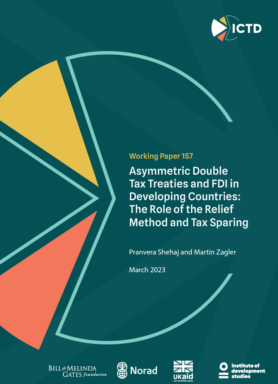Working Paper 157
This study focuses on asymmetric tax treaties and investigates the impact of OECD member states’ double tax relief method and of treaty tax sparing provisions on investments in developing countries, while considering network effects. In addition, it analyses the impact of a residence country’s tax relief method on the source country’s tax policy. Our results suggest that having a treaty between the OECD member state and the developing country, which improves the investor’s conditions in terms of tax burden by changing the unilateral tax relief method, increases FDI to the developing country. The positive effect prevails when investigated within investments made through the direct route from home to host. Furthermore, results suggest that OECD member states offer tax sparing provisions mostly to less-developed economies, which already receive very low, if any, foreign direct investment. Finally, we find that developing countries set higher corporate income tax (CIT) when the OECD member state relieves double taxation through the exemption method, as compared to when it offers a foreign tax credit, while the inclusion of tax sparing agreements has a positive effect on the CIT.
